Fleurs du Mal Magazine


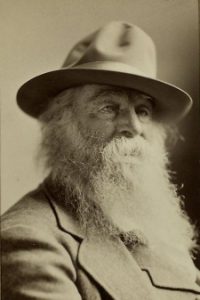
R e s p o n d e z !
Respondez! Respondez!
(The war is completed the price is paid the title is settled beyond recall;)
Let every one answer! let those who sleep be waked! let none evade!
Must we still go on with our affectations and sneaking?
Let me bring this to a close I pronounce openly for a new distribution of roles;
Let that which stood in front go behind! and let that which was behind advance to the front and speak;
Let murderers, bigots, fools, unclean persons, offer new propositions!
Let the old propositions be postponed!
Let faces and theories be turn’d inside out! let meanings be freely criminal, as well as results!
Let there be no suggestion above the suggestion of drudgery!
Let none be pointed toward his destination! (Say! do you know your destination?)
Let men and women be mock’d with bodies and mock’d with Souls!
Let the love that waits in them, wait! let it die, or pass stillborn to other spheres!
Let the sympathy that waits in every man, wait! or let it also pass, a dwarf, to other spheres!
Let contradictions prevail! let one thing contradict another! and let one line of my poems contradict another!
Let the people sprawl with yearning, aimless hands! let their tongues be broken! let their eyes be discouraged! let none descend into their hearts with the fresh lusciousness of love!
(Stifled, O days! O lands! in every public and private corruption!
Smother’d in thievery, impotence, shamelessness, mountain-high;
Brazen effrontery, scheming, rolling like ocean’s waves around and upon you, O my days! my lands!
For not even those thunderstorms, nor fiercest lightnings of the war, have purified the atmosphere;)
Let the theory of America still be management, caste, comparison! (Say! what other theory would you?)
Let them that distrust birth and death still lead the rest! (Say! why shall they not lead you?)
Let the crust of hell be neared and trod on! let the days be darker than the nights! let slumber bring less slumber than waking time brings!
Let the world never appear to him or her for whom it was all made!
Let the heart of the young man still exile itself from the heart of
the old man! and let the heart of the old man be exiled from that of the young man!
Let the sun and moon go! let scenery take the applause of the audience! let there be apathy under the stars!
Let freedom prove no man’s inalienable right! every one who can tyrannize, let him tyrannize to his satisfaction!
Let none but infidels be countenanced!
Let the eminence of meanness, treachery, sarcasm, hate, greed, indecency, impotence, lust, be taken for granted above all! let writers, judges, governments, households, religions, philosophies, take such for granted above all!
Let the worst men beget children out of the worst women!
Let the priest still play at immortality!
Let death be inaugurated!
Let nothing remain but the ashes of teachers, artists, moralists, lawyers, and learn’d and polite persons!
Let him who is without my poems be assassinated!
Let the cow, the horse, the camel, the garden-bee let the mudfish, the lobster, the mussel, eel, the sting-ray, and the grunting pig-fish let these, and the like of these, be put on a perfect equality with man and woman!
Let churches accommodate serpents, vermin, and the corpses of those who have died of the most filthy of diseases!
Let marriage slip down among fools, and be for none but fools!
Let men among themselves talk and think forever obscenely of women! and let women among themselves talk and think obscenely of men!
Let us all, without missing one, be exposed in public, naked, monthly, at the peril of our lives! let our bodies be freely handled and examined by whoever chooses!
Let nothing but copies at second hand be permitted to exist upon the earth!
Let the earth desert God, nor let there ever henceforth be mention’d the name of God!
Let there be no God!
Let there be money, business, imports, exports, custom, authority, precedents, pallor, dyspepsia, smut, ignorance, unbelief!
Let judges and criminals be transposed! let the prison-keepers be put in prison! let those that were prisoners take the keys! Say! why might they not just as well be transposed?)
Let the slaves be masters! let the masters become slaves!
Let the reformers descend from the stands where they are forever bawling! let an idiot or insane person appear on each of the stands!
Let the Asiatic, the African, the European, the American, and the Australian, go armed against the murderous stealthiness of each other! let them sleep armed! let none believe in good will!
Let there be no unfashionable wisdom! let such be scorn’d and derided off from the earth!
Let a floating cloud in the sky let a wave of the sea let growing mint, spinach, onions, tomatoes let these be exhibited as shows, at a great price for admission!
Let all the men of These States stand aside for a few smouchers! let the few seize on what they choose! let the rest gawk, giggle, starve, obey!
Let shadows be furnish’d with genitals! let substances be deprived of their genitals!
Let there be wealthy and immense cities but still through any of them, not a single poet, savior, knower, lover!
Let the infidels of These States laugh all faith away! If one man be found who has faith, let the rest set upon him!
Let them affright faith! let them destroy the power of breeding faith!
Let the she-harlots and the he-harlots be prudent! let them dance on, while seeming lasts! (O seeming! seeming! seeming!)
Let the preachers recite creeds! let them still teach only what they have been taught!
Let insanity still have charge of sanity!
Let books take the place of trees, animals, rivers, clouds!
Let the daub’d portraits of heroes supersede heroes!
Let the manhood of man never take steps after itself!
Let it take steps after eunuchs, and after consumptive and genteel persons!
Let the white person again tread the black person under his heel! (Say! which is trodden under heel, after all?)
Let the reflections of the things of the world be studied in mirrors! let the things themselves still continue unstudied!
Let a man seek pleasure everywhere except in himself!
Let a woman seek happiness everywhere except in herself! (What real happiness have you had one single hour through your whole life?)
Let the limited years of life do nothing for the limitless years of death! (What do you suppose death will do, then?)
Walt Whitman
(1819 – 1892)
Respondez!
• fleursdumal.nl magazine
More in: Archive W-X, Archive W-X, WAR & PEACE, Whitman, Walt
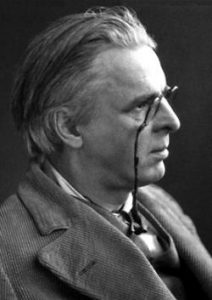
The Arrow
I thought of your beauty, and this arrow,
Made out of a wild thought, is in my marrow.
There’s no man may look upon her, no man,
As when newly grown to be a woman,
Tall and noble but with face and bosom
Delicate in colour as apple blossom.
This beauty’s kinder, yet for a reason
I could weep that the old is out of season.
William Butler Yeats
(1865-1939)
The Arrow
• fleursdumal.nl magazine
More in: Archive Y-Z, Archive Y-Z, Yeats, William Butler
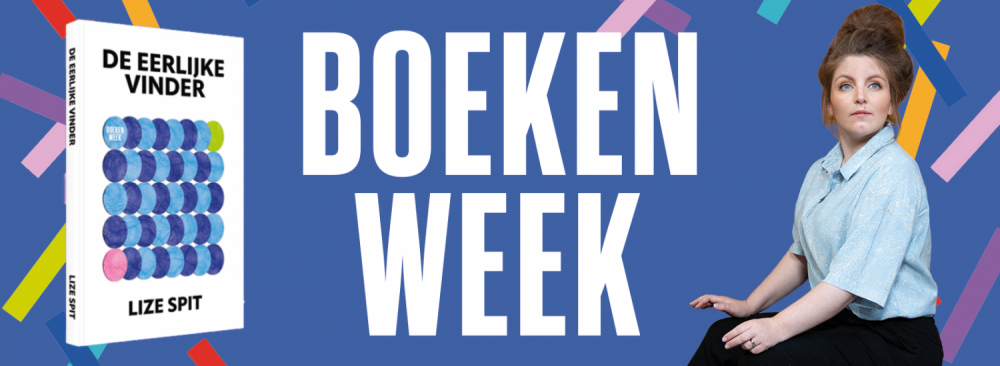
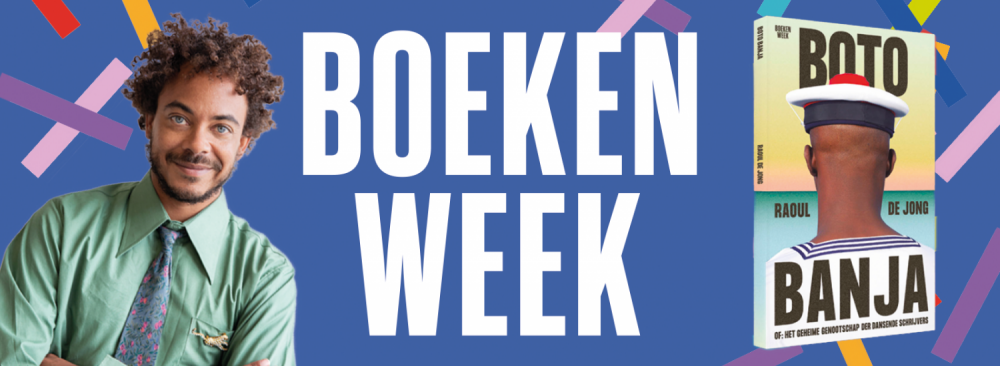
More in: - Audiobooks, - Book Lovers, - Book News, - Book Stories, - Bookstores, AUDIO, CINEMA, RADIO & TV, Boekenweek, The Art of Reading
The Philosophy of Modern Song is Bob Dylan’s first book of new writing since 2004’s Chronicles: Volume One—and since winning the Nobel Prize for Literature in 2016.
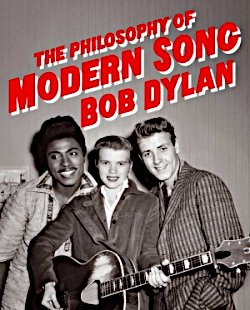 Dylan, who began working on the book in 2010, offers his extraordinary insight into the nature of popular music.
Dylan, who began working on the book in 2010, offers his extraordinary insight into the nature of popular music.
He writes over sixty essays focusing on songs by other artists, spanning from Stephen Foster to Elvis Costello, and in between ranging from Hank Williams to Nina Simone.
He analyzes what he calls the trap of easy rhymes, breaks down how the addition of a single syllable can diminish a song, and even explains how bluegrass relates to heavy metal.
These essays are written in Dylan’s unique prose. They are mysterious and mercurial, poignant and profound, and often laugh-out-loud funny. And while they are ostensibly about music, they are really meditations and reflections on the human condition.
Running throughout the book are nearly 150 carefully curated photos as well as a series of dream-like riffs that, taken together, resemble an epic poem and add to the work’s transcendence.
In 2020, with the release of his outstanding album Rough and Rowdy Ways, Dylan became the first artist to have an album hit the Billboard Top 40 in each decade since the 1960s.
The Philosophy of Modern Song contains much of what he has learned about his craft in all those years, and like everything that Dylan does, it is a momentous artistic achievement.
Bob Dylan has released thirty-nine studio albums, which collectively have sold over 125 million copies around the world. He won the Nobel Prize in Literature and has been awarded the French Legion of Honor, a Pulitzer Prize Special Citation, and the Presidential Medal of Freedom, the country’s highest civilian honor. His memoir, Chronicles: Volume One, spent a year on the New York Times bestseller list.
The Philosophy of Modern Song
by Bob Dylan
Publisher: Simon & Schuster
November 1, 2022
Language: English
Hardcover
352 pages
ISBN-10: 1451648707
ISBN-13: 978-1451648706
$22.50
• fleursdumal.nl magazine
More in: - Book News, - Bookstores, Archive C-D, Archive C-D, AUDIO, CINEMA, RADIO & TV, Bob Dylan, Dylan, Bob
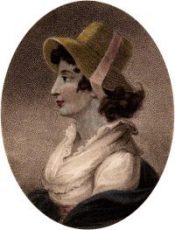
The Rights of Women
Yes, injured Woman! rise, assert thy right!
Woman! too long degraded, scorned, opprest;
O born to rule in partial Law’s despite,
Resume thy native empire o’er the breast!
Go forth arrayed in panoply divine;
That angel pureness which admits no stain;
Go, bid proud Man his boasted rule resign,
And kiss the golden sceptre of thy reign.
Go, gird thyself with grace; collect thy store
Of bright artillery glancing from afar;
Soft melting tones thy thundering cannon’s roar,
Blushes and fears thy magazine of war.
Thy rights are empire: urge no meaner claim,—
Felt, not defined, and if debated, lost;
Like sacred mysteries, which withheld from fame,
Shunning discussion, are revered the most.
Try all that wit and art suggest to bend
Of thy imperial foe the stubborn knee;
Make treacherous Man thy subject, not thy friend;
Thou mayst command, but never canst be free.
Awe the licentious, and restrain the rude;
Soften the sullen, clear the cloudy brow:
Be, more than princes’ gifts, thy favours sued;—
She hazards all, who will the least allow.
But hope not, courted idol of mankind,
On this proud eminence secure to stay;
Subduing and subdued, thou soon shalt find
Thy coldness soften, and thy pride give way.
Then, then, abandon each ambitious thought,
Conquest or rule thy heart shall feebly move,
In Nature’s school, by her soft maxims taught,
That separate rights are lost in mutual love.
Anna Laetitia Barbauld
(1743 – 1825)
The Rights of Women
Anna Laetitia Barbauld wrote this poem in 1793,
in response to Mary Wollstonecraft’s ‘A Vindication of the Rights of Woman´.
• fleursdumal.nl magazine
More in: # Classic Poetry Archive, Archive A-B, Archive A-B, Feminism, The Ideal Woman
In O, artist and writer Tammy Nguyen returns to Vietnam to visit the caves of the Phong Nha Karst.
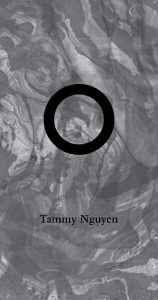 This journey into the Karst’s “wind-carved teeth” resounds with the traditional songs of Nguyen’s guides, whose melodies produce the O-O-O-O-O-O-O-O that echoes through narratives woven together around it as a visual and sonic spine: the story of Nguyen’s Uncle Van, an opportunistic businessman who traded in Vietnamese porcelain vessels; her coming-of-age as a child with missing teeth, and the material and mineral histories of the veneers that eventually completed her “American Smile”; the plastic paradise of the man-made island of Forest City, a simulacrum of natural beauty kept uncannily bright and lush by the flow of global investment capital; and, behind it all, a retelling of Plato’s Allegory of the Cave that supplies what the original parable lacked: an understanding of fantasy’s role in the construction of a sublime.
This journey into the Karst’s “wind-carved teeth” resounds with the traditional songs of Nguyen’s guides, whose melodies produce the O-O-O-O-O-O-O-O that echoes through narratives woven together around it as a visual and sonic spine: the story of Nguyen’s Uncle Van, an opportunistic businessman who traded in Vietnamese porcelain vessels; her coming-of-age as a child with missing teeth, and the material and mineral histories of the veneers that eventually completed her “American Smile”; the plastic paradise of the man-made island of Forest City, a simulacrum of natural beauty kept uncannily bright and lush by the flow of global investment capital; and, behind it all, a retelling of Plato’s Allegory of the Cave that supplies what the original parable lacked: an understanding of fantasy’s role in the construction of a sublime.
In O’s anti-allegory, the personal and geopolitical sit uncomfortably alongside one another. The shape of a bowl becomes the mouth of a cave. The uncanny naturalism of Nguyen’s zirconium veneers reflect Forest City’s manicured paradise.
What emerges is a kaleidoscopic meditation on the play of language across scales: how it rebounds between our stories of self and the semantic regimes of global capital alike.
Tammy Nguyen is a multimedia artist and writer whose work spans painting, drawing, printmaking, and publishing. Intersecting geopolitical realities with fiction, her practice addresses lesser-known histories through a blend of myth and visual narrative. She is the founder of Passenger Pigeon Press, an independent press that joins the work of scientists, journalists, creative writers, and artists to create politically nuanced and cross-disciplinary projects. In 2008, she received a Fulbright scholarship to study lacquer painting in Vietnam, where she remained and worked with a ceramics company for three years thereafter. Nguyen received an MFA from Yale in 2013 and was awarded the Van Lier Fellowship at Wave Hill in 2014 and a NYFA Fellowship in painting in 2021. She was included in Greater New York 2021 at MOMA PS1 and has also exhibited at Nichido Contemporary Art in Japan, Smack Mellon, Rubin Museum, The Factory Contemporary Arts Centre in Vietnam, and the Bronx Museum, among others. Her work is included in the collections of Yale University, the Philadelphia Museum of Art, MIT Library, the Seattle Art Museum, the Walker Art Center Library, and the Museum of Modern Art Library. She is Assistant Professor of Art at Wesleyan University.
O
by Tammy Nguyen
Binding:Paperback
Pages:144
Publ.date:9/1/2022
Publisher: Ugly Duckling Presse
Product Number:9781946433916
ISBN: 978-1-946433-91-6
Price: $ 30.00
• fleursdumal.nl magazine
More in: - Book News, - Bookstores, Archive M-N, Archive M-N
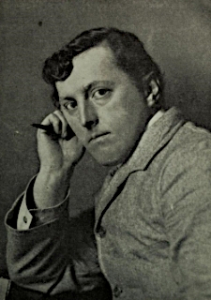
Poems
No Muse will I invoke; for she is fled!
Lo! where she sits, breathing, yet all but dead.
She loved the heavens of old, she thought them fair;
And dream’d of Gods in Tempe’s golden air.
For her the wind had voice, the sea its cry;
She deem’d heroic Greece could never die.
Breathless was she, to think what nymphs might play
In clear green depths, deep-shaded from the day;
She thought the dim and inarticulate god
Was beautiful, nor knew she man a sod;
But hoped what seem’d might not be all untrue,
And feared to look beyond the eternal blue.
But now the heavens are bared of dreams divine.
Still murmurs she, like Autumn, ´This was mine!’
How should she face the ghastly, jarring Truth,
That questions all, and tramples without ruth?
And still she clings to Ida of her dreams,
And sobs, ´Ah! let the world be what it seems!’
Then the shy nymph shall softly come again;
The world, once more, make music for her pain.
For, sitting in the dim and ghostly night,
She fain would stay the strong approach of light;
While later bards cleave to her, and believe
That in her sorrow she can still conceive!
Oh, let her dream; still lovely is her sigh;
Oh, rouse her not, or she shall surely die.
Stephen Phillips
(1864 – 1915)
Poems
• fleursdumal.nl magazine
More in: #Editors Choice Archiv, Archive O-P, Archive O-P
A WHEEL A STONE A ROPE A WING
exhibition
04.03 – 08.04 2023
Matea Bakula (BA/NL)
Ruta Butkute (LT/NL)
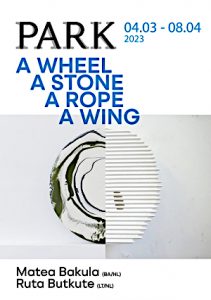 How do you show movement in a static object? And how would you place this object in alarge exhibition space? How would you want the audience to perceive this, and how do you combine all of this into a playing field for a professional dancer?
How do you show movement in a static object? And how would you place this object in alarge exhibition space? How would you want the audience to perceive this, and how do you combine all of this into a playing field for a professional dancer?
These are the questions Matea Bakula (1990) and Ruta Butkute (1984) have been working on recently at PARK. The answers to these questions were the inspiration of this exhibition focusing on movement, dynamics and interaction between people, objects and space.
The visitor is invited to experience rather than view this presentation. Realize that the works are made in dialogue with the space in which they are presented and explore your own role as spectator within this interplay.
The exhibition can be visited during normal opening hours. These are additional activities with the artists:
Saturday 4 March 16:00 | Opening
With the performance Collide, a choreography by Ruta Butkute and performed by Yurie Umamoto
Saturday 11 March 16.00 | Guided tour
Experience the exhibition together with the artists, Matea Bakula and Ruta Butkute
Saturday 8 April 16.00 | Finnisage
With the performance Collide, a choreography by Ruta Butkute and performed by Yurie Umamoto
A WHEEL A STONE A ROPE A WING
PARK is an art initiative founded by Rob Moonen in cooperation with six other artists living in Tilburg. At this moment the PARK staff consists of Linda Arts, René Korten, Rob Moonen and Lieve van den Bijgaart.
PARK is a platform for contemporary visual arts positioning itself between Kunstpodium T and Museum De Pont. PARK organizes an exhibition program in the former Goretti Chapel at the Wilhelminapark in Tilburg.
PARK
Wilhelminapark 53, NL-5041 ED Tilburg
park(at)park013.nl
Twitter.com/ParkTilburg
Facebook.com/Park013
Instagram.com/platform_for_visual_arts
Opening hours during exhibitions:
Friday 1-5 pm
Saturday 1-5 pm
Sunday 1-5 pm
Free admission
PARK is on 10 minutes walking distance from Tilburg-Central-Station in the direct neighborhood of Museum De Pont. There is limited parking space in front of the building.
• fleursdumal.nl magazine
More in: Art & Literature News, DANCE & PERFORMANCE, Exhibition Archive, FDM Art Gallery, Linda Arts, Park, Sculpture
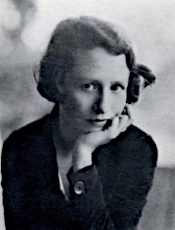
Travel
The railroad track is miles away,
And the day is loud with voices speaking,
Yet there isn’t a train goes by all day
But I hear its whistle shrieking.
All night there isn’t a train goes by,
Though the night is still for sleep and dreaming,
But I see its cinders red on the sky,
And hear its engine steaming.
My heart is warm with the friends I make,
And better friends I’ll not be knowing,
Yet there isn’t a train I wouldn’t take,
No matter where it’s going.
Edna St. Vincent Millay
(1892 – 1950)
Travel
• fleursdumal.nl magazine
More in: Archive M-N, Archive M-N, Millay, Edna St. Vincent
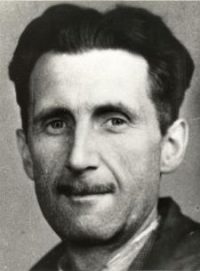
The Italian Soldier
Shook My Hand
The Italian soldier shook my hand
Beside the guard-room table;
The strong hand and the subtle hand
Whose palms are only able
To meet within the sounds of guns,
But oh! what peace I knew then
In gazing on his battered face
Purer than any woman’s!
For the flyblown words that make me spew
Still in his ears were holy,
And he was born knowing that I had learned
Out of books and slowly.
The treacherous guns had told their tale
And we both had bought it,
But my gold brick was made of gold –
Oh! who ever would have thought it?
Good luck go with you, Italian soldier!
But luck is not for the brave;
What would the world give back to you?
Always less than you gave.
Between the shadow and the ghost,
Between the white and the red,
Between the bullet and the lie,
Where would hide your head?
For where is Manuel Gonzalez,
And where is Pedro Aguilar,
And where is Ramon Fenellosa?
The earthworms know where they are.
Your name and your deeds were forgotten
Before your bones were dry,
And the lie that slew you is buried
Under a deeper lie;
But the thing that I saw in your face
No power can disinherit:
No bomb that ever burst
Shatters the crystal spirit.
George Orwell
(1903 – 1950)
The Italian Soldier Shook My Hand
• fleursdumal.nl magazine
Taken from ‘Looking Back on the Spanish War’, published by New Road, 1943. Poem written 1939
More in: Archive O-P, Archive O-P, George Orwell, Orwell, George
In a landscape scarred by conflict, two women begin a quest for a lost child and a lost world of peace.
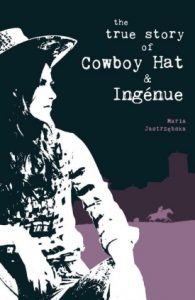 Bound together by love and acceptance, their story and path interweave with fellow outcasts — people like the ever-suave Dame Blanche, Sister Asunta, martial artist and magician, Master Wu Wu, and the lost soul, Tulip — but whether peace is simply the end of war or something deeper is something they must discover for themselves.
Bound together by love and acceptance, their story and path interweave with fellow outcasts — people like the ever-suave Dame Blanche, Sister Asunta, martial artist and magician, Master Wu Wu, and the lost soul, Tulip — but whether peace is simply the end of war or something deeper is something they must discover for themselves.
A haunting tale, told in a series of visionary prose poems, The True Story of Cowboy Hat & Ingénue interweaves memory and yearning to ask questions that reflect on our past and, disturbingly, on our futures.
Maria Jastrzębska is a Polish-born poet, editor and translator. Her most recent collection was At The Library of Memories (Waterloo Press 2013) and her selected poems, The Cedars of Walpole Park, have been translated into Polish by Anna Błasiak, Paweł Gawroński and Wioletta Grzegorzewska and published bilingually (Stowarzyszenie ŻŻwych Poetów 2015). Old Knives is a selection of her work translated into Romanian by Lidia Vianu and published bilingually by Integral Contemporary Literature Press (2017). She was co-editor with Anthony Luvera of Queer in Brighton (New Writing South 2014). She co-translated Iztok Osojnik’s selected poems Elsewhere with Ana Jelnikar and her translations of Justyna Bargielska’s selected poems The Great Plan B are published by Smokestack Press (2017). Her work features in the British Library poetry and translation project Poetry Between Two Worlds. Dementia Diaries, her literary drama, toured nationally with Lewes Live Lit in 2011. Her poems have been much anthologized from The Virago Book of Wicked Verse (1992) to This Line Is Not For Turning — An Anthology of Contemporary British Prose Poetry (Cinnamon Press 2011) and Hallelujah for 50ft Women (Bloodaxe 2015). Maria lives in Brighton and you can discover more about her work on her website. (https://mariajastrzebska.wordpress.com/)
The True Story of Cowboy Hat & Ingénue
Maria Jastrzębska
Prose-poetry
Language: English
Publisher: Cinnamon Press
2018
Paperback
70 pages
ISBN-10: 1911540033
ISBN-13: 978-1911540038
Price: 14,27 euro
• fleursdumal.nl magazine
More in: #Editors Choice Archiv, - Book News, - Bookstores, Archive I-J, Archive I-J, Cowboy Poetry
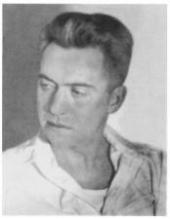
At Melville’s Tomb
Often beneath the wave, wide from this ledge
The dice of drowned men’s bones he saw bequeath
An embassy. Their numbers as he watched,
Beat on the dusty shore and were obscured.
And wrecks passed without sound of bells,
The calyx of death’s bounty giving back
A scattered chapter, livid hieroglyph,
The portent wound in corridors of shells.
Then in the circuit calm of one vast coil,
Its lashings charmed and malice reconciled,
Frosted eyes there were that lifted altars;
And silent answers crept across the stars.
Compass, quadrant and sextant contrive
No farther tides . . . High in the azure steeps
Monody shall not wake the mariner.
This fabulous shadow only the sea keeps.
Hart Crane
(1889 – 1932)
At Melville’s Tomb
• fleursdumal.nl magazine
More in: Archive C-D, Archive C-D, Crane, Hart, Herman Melville
Thank you for reading Fleurs du Mal - magazine for art & literature